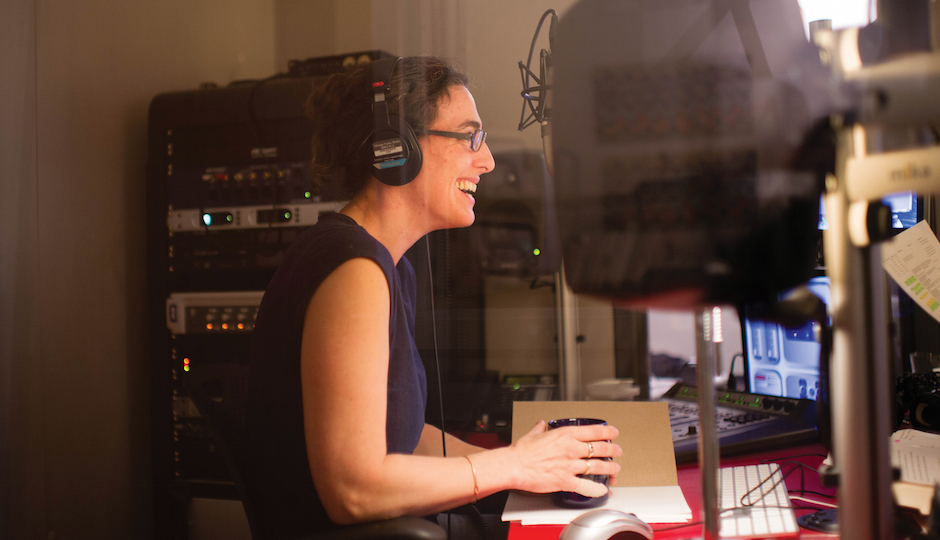6 Questions for Podcasting Sensation Sarah Koenig
Serial was a riveting, record-breaking, 12-part podcast series that re-investigated the murder of Baltimore teenager Hae Min Lee. Her ex-boyfriend, Adnan Syed, was convicted of the crime, but he has always insisted he is innocent.
As a fan, I’m in awe of the show’s reporting, which revealed deep flaws in the criminal justice system, as well as its deft storytelling that hooked listeners.
As a journalist, I have questions: Has Serial changed podcasting forever? Does its success mean all the wonderful things I want it to mean for investigative reporting? And on the flip side, was it worth it to reexamine a murder case if it wasn’t obvious in the end whether Syed did it?
In advance of Serial creators Sarah Koenig and Julie Snyder‘s live presentation Thursday night at the Kimmel Center (details here), I interviewed Koenig. Our questions have been paraphrased her responses have been edited lightly for clarity.
Ticket: Serial was the most popular podcast in the world. Now that some time has passed, why do you think it caught fire?
Koenig: We had no idea why, we had like no idea, and now with a little bit of time, we’ve kind of started to think about what just happened and why did that just happen. And I think it’s a bunch of things. It’s funny, none of the elements that we did are new, you know what I mean? To re-investigate a murder case is not a new idea. A serial is not a new idea. Podcasts are not new. But there was something about the combination of all the elements that we chose to put together in one medium that felt really new.
And I think people weren’t used to hearing journalism in that form, in a sort of serialized audio podcast where you had to stick with it week to week, where I was a very strong narrator, so I’m leading you through almost like a character. And I think all of that felt new and I think that’s what was interesting for people. And then crime stories are unfortunately very, very popular for people, which I also weirdly had not understood going in. I didn’t get that, oh, it’s a murder story and people are going to be interested. I didn’t foresee that. Because I’m an idiot [laughs].
Ticket: Because Serial was such a huge success, there were a lot of conversations about whether this was a sign that podcasts or audio could be viral, and that podcasts could get over some of the challenges that they face. What do you think the last impact of Serial will be on podcasting?
Koenig: I’m going to object to the word “viral.” I think of viral as a squirrel skateboarding. To toot my own horn a little bit here, I think part of what kept people with Serial and what we did with Serial is, it was really painstakingly reported and structured and produced, so our goal before we even totally knew what story we were going to do — well, we knew pretty quickly what story we were going to do — but right away we thought if we do a podcast, it’s going to be the same quality as This American Life. It’s not going to be crappier quality just because it’s a podcast. Just because we could cut corners, we’re not going to cut corners.
I think people responded to that. I don’t think it was just a lucky, freak thing, like, oh, there’s a squirrel skateboarding, you got to check it out. I think people actually responded to the quality of it. So my hope is that what that tells people who do this kind of work, and editors and publishers and the people who work in this business, is that you can take a long time and you can invest a lot of time and money in a project that is slow and that is long-term, and people will stay with you. We live in this world that’s quicker, quicker, faster, faster, more, more, more, more. And we kind of did the opposite with Serial.
Ticket: Jay Wilds, a key witness in the case, wouldn’t be interviewed formally on tape by you. Did that ever give you pause? Did you ever think, “Maybe I won’t do this story because he won’t talk”?
Koenig: No. I mean look, when you report any kind of story like this there’s always people who — well, not always, but very often — there’s people who won’t talk to you. And that’s the nature of our job. I think it would have been different if we had no way to represent his side of things or his part of it, but we had these police interviews, so that was huge. That was a way to understand what he said and when he said it. And we held out … I held out hope for a long time that he would change his mind. We were still in communication through the end. So I hoped he would change his mind. Unfortunately, he didn’t. That’s part of the job. If we didn’t do a story every time a source didn’t talk to us, boy, that would really bankrupt journalism in this country.
I think the thing that we kept in mind all the time was, I didn’t see villains in this story. I didn’t see heroes in this story. We didn’t want anyone to be a cartoon character in a murder story. That’s just not what we’re interested in. We wanted everyone to be three-dimensional as much as possible and the reporting was just, okay, we can’t talk to this person. Well, who knows this person and who remembers and who was around? And we talked to as many people as we could about those people to make sure that we got as full a picture as we could and present that, so that it felt fair to us.
Ticket: After the podcast came out, Jay did an interview and he said he thought that you were unfair to him and even “demonized” him. I was wondering how you felt when you read that. And do you think it’s ever possible to fairly and fully portray someone’s point of view when they themselves have not made their case to you?
Koenig: Well, I felt disappointed that he wouldn’t talk to me. I wish he’d talked to me. I knew that he was upset and so there was nothing hugely surprising that I read in his interview that he said about me. I wasn’t sort of shocked by any of that.
Even since that interview, I’ve said that, “If you ever want to talk, I’m still here, I’m always ready to listen.” So that was much as I could do. Look, I think even when you do talk to someone, it’s very, very hard to portray them exactly as they want to be portrayed, or to know somebody. I have 42 hours of tape with Adnan Syed and I’m not sure I got him totally accurately either. It’s a very, very tricky thing to describe another person’s experience. This is what we do all the time as reporters or as writers. It’s incredibly tricky territory for sure.
Ticket: Why did you decide to not finish reporting the entire story before airing it?
Koenig: We wanted to do it for a couple of reasons. One thing we thought was, could we make a show where you’re literally just reporting that week, and then coming and then airing at the end of the week what you just learned? Like you’re following it really in real time, some sort of documentary? And we knew this story, you couldn’t do that for this story, obviously. But we still wanted it to feel kind of alive, kind of vital in the sense of having life in it. And so having me still reporting helped give it that feeling that you were with me as I was doing it.
… More importantly, though, is a story like this, we didn’t know what we didn’t know. It’s one of those stories where we have all the documents and we can interview all the people we think to interview, but there are people who might come forward and say, “Look, I know something about this.” And we wanted to be able to respond to new information as we went forward, and that happened a lot, like people did come forward or people who initially said “no” to me to an interview, then would hear what we were doing and then would come back and say, “Yeah, I’ll do it.” That was hugely important. You can imagine if we had just done our thing and then aired it, and then people had come forward and said, “Wait, this is different,” or “I have new information or this might change things,” we would’ve been in a position to just be like, “Oh. Oh well. Sorry.” This way we could respond to new information, and that was really important.
Ticket: One question people asked about Serial was, “Why make the victim’s families and friends go through all this again if you can’t prove this person is innocent?” What would you say to them?
Koenig: We talked about that a lot, and I think that is definitely a question you ask as a reporter. But we would not have done this story if we didn’t think there was something wrong with this case. So to me, that is important. If there’s something wrong with this case, that means there’s something wrong possibly with our system, and that’s a big thing. Obviously, we didn’t want anyone to be hurt by anything that we did. On the other hand, we weren’t creating problems where there were none. So, again, if you didn’t report because you worried how someone might feel, think about what stories then don’t happen.
It’s funny, I think that we’re getting these questions asked a lot, as if we broke rules or something. And I don’t mean to be defensive about it, but it is interesting to me that somehow, you know, I’m not sure that reporters are calling up magazine writers and saying, “Do you think it’s fair that you didn’t do this or that?” I think everything we did falls so solidly in the world of standard traditional journalism and journalistic practices.



